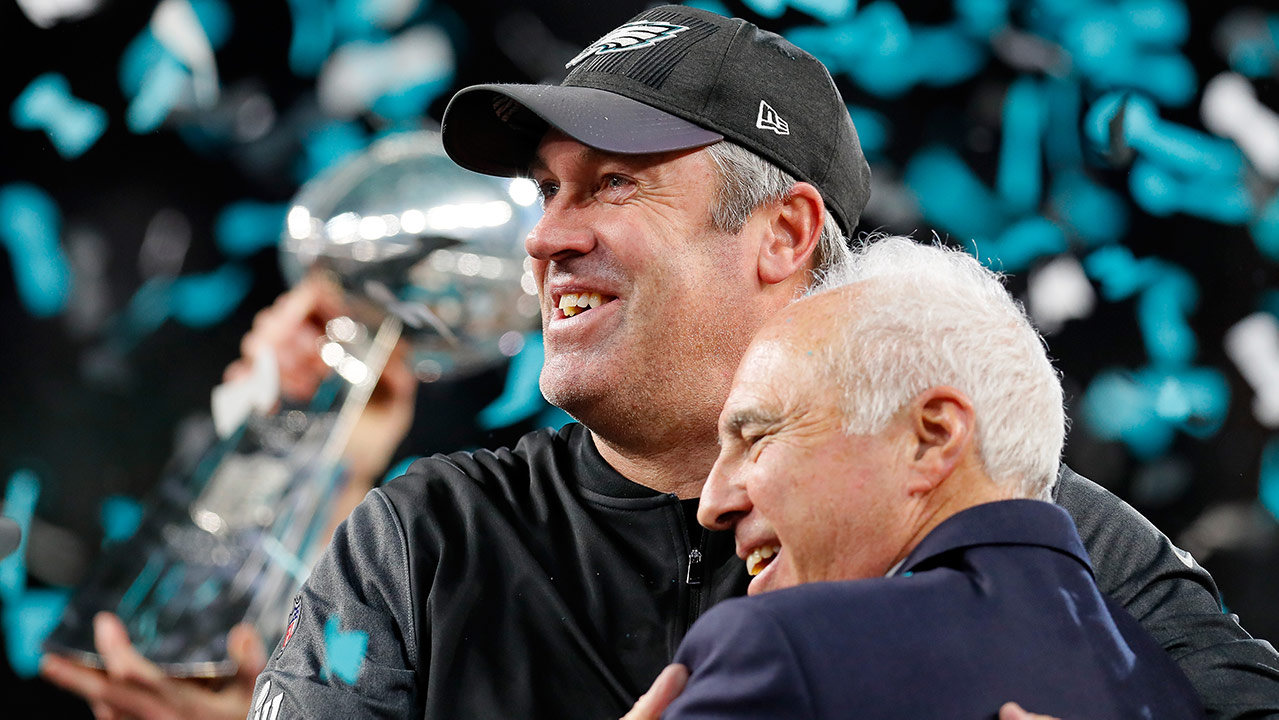I knew one thing about Doug Pederson when he became head coach of the Philadelphia Eagles four years ago: He was the quarterback that led a game-winning drive for the Eagles against Dallas in the game where fans cheered Michael Irvin’s career-ending injury. Hey, he beat the Cowboys. Couldn’t be too bad.
The only other thing I really knew was that he appeared to be the Eagles' last choice. The Eagles interviewed Adam Gase, who took the Dolphins job. At one point the reported favorite was Tom Coughlin, who later removed himself from consideration after a disastrous interview. The Eagles were all set to hire Ben McAdoo, and even had a gift basket waiting for him, but he turned around and took the Giants' job.
Doug Pederson was hired five years ago this month, and lasted longer than either McAdoo (fired midway through his second year) or Gase (fired by the Dolphins in 2018, and fired again by the Jets this year). Today, though, Pederson’s Philadelphia Eagles tenure ended. Owner Jeffrey Lurie has fired Pederson, just three years after he coached the team to its first Super Bowl victory.
Pederson had a rough year. It fell mainly on the quarterbacks. Carson Wentz—who signed a massive four-year extension in 2019—looked like 1991 Pat Ryan. Wentz, who has not been the player he was during the Eagles’ Super Bowl season, led the league in interceptions despite only playing in 12 games. The backup the Eagles inexplicably drafted in the second round last year, Jalen Hurts, was exciting at times but could be the team’s next Bobby Hoying—a flash in the pan.
And then there was Pederson’s decision in the final game of the season. With the Eagles trailing, 17-14, he removed Hurts for third-stringer Nate Sudfeld. The Eagles probably would not have won the game anyway. But Sudfeld turned it over twice in his first five plays, the Eagles lost 20-14, and then took a lot of heat for putting in an inferior quarterback in order to ensure themselves a better draft pick.
To me, putting in Nate Sudfeld was not even close to Pederson’s most infuriating decision this year. My pick would be the usage of Travis Fulgham, who looked like a breakout young star midway through the year and was barely used after the Eagles’ bye week. Yes, Alshon Jeffery had previously made some important catches for the Eagles in the playoffs, but he didn’t need to be starting in 2020 over a younger, promising guy.
But I don’t even need to go that deep. How about Pederson’s multiple third-and-long handoffs this year, even if one went for a 74-yard touchdown? How about Carson Wentz occasionally running play action fakes to no one? How about playing for the tie against the Bengals???
But obviously the 2020 season won’t be my primary memory of Doug Pederson. It will be the 2017 season, the run to the Super Bowl that winter, and the fact that I got to see it in person and interviewed Morris Chestnut at the Mall of America the day before. And what I will remember about his coaching style is one thing: He tended to go for it on fourth down.
This was great. Stat wizards will tell you that going for it is the positive play, that you will tend to win more over the long run if you go for it more on fourth down. I agree. But going for it on fourth down is also fun. It gets me out of my chair and ready to scream at the television. When it works, I am ecstatic. I am ready to see the Eagles go for it pretty much anytime they want to.
And Pederson did. His first year, when the Eagles went 7-9, Pederson went for it 27 times—most in the NFL. Generally, he was killed for it, as the Eagles went from a 3-0 start to a 4-9 stretch run. Mike Lombardi, an Ocean City, New Jersey, native and former NFL executive, said in September 2017 that Pederson was “less qualified to coach a team than anyone I've ever seen in my 30-plus years in the NFL."
“When will the Eagles admit their mistake? Will they throw away 2017 by stubbornly sticking to the Pederson Principle?" he asked.
It turns out Lombardi had salt water taffy up his nose when he made those predictions. That year, including the playoffs, Pederson made the decision to go for it 29 times. Philly Voice’s Jimmy Kempski tracked these decisions for that season, and calculated that the Eagles added 74 points with their aggressiveness—only losing out on three points because of a failed fourth-down decision. The two biggest fourth-down calls came in the Super Bowl: The “Philly Special” pass to Nick Foles, and Foles’s touchdown pass to Ertz that was the game-winning score.
Despite the stupidest coach in the NFL winning the Super Bowl with an aggressive strategy, people still criticized Pederson for his fourth-down tactics in subsequent seasons. (It wasn’t quite as successful in 2018; Kempski calculated it at 54 points gained, 23 points lost for the following season.) But I was always over the moon when the Eagles went for it.
And the rest of the NFL noticed, too. Teams go for it way more often now. An article on NFL.com last year called going for it on fourth “the new norm.” Doug Pederson won a Super Bowl in part by being aggressive on fourth down, and now the whole NFL—with the exception of Mike Vrabel, I guess—goes for it in advantageous situations. It’s so much more fun!
So, yes, I will remember Doug Pederson as the guy who improved my enjoyment of football—not just for winning the Super Bowl, but for going for it. The Pederson era didn't end well, but I have no regrets or worries. I'm at peace with it.






